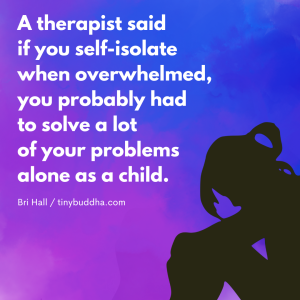
“He who knows that enough is enough will always have enough.” ~Lao Tzu
I’m at war with enoughness.
My stomach isn’t flat enough; I’m not extroverted enough; I don’t have enough money in my wallet; I’m not creative enough; I’m not getting enough work done.
There are times when the Jaws of Life cannot free me from my expectations and negative self-talk. The battle with enoughness is a vicious cycle.
Here’s an example: I’m both shy and introverted, so I’m afraid of being judged and I prefer quiet environments.
I was easily overlooked in school because I was reluctant to participate verbally in class.
During work meetings my ideas were mere whispers compared to the loud shouts from some of my extroverted coworkers.
Because I prefer staying home on Friday nights, my peers often ask me, “What’s wrong?”
I’ve convinced myself that something must be wrong with me, so when I have the opportunity to do something social, I either don’t go or I walk into the situation feeling self-conscious and inadequate.
Both of these choices fuel criticism. “See, I told you so,” my inner critic says. “You really aren’t enough!”
The Merriam-Webster Dictionary defines enough as “occurring in such quantity, quality, or scope as to fully meet demands, needs, or expectations.”
When I criticize myself for not being enough or having enough, whose expectations am I trying to meet?
It’s too easy to point my finger at society—the society that favors those with the loudest voices; equates self-worth with “what I do for a living;” and glamorizes infidelity, drug abuse, and teenage pregnancy. We’re all affected by the society we live in, there’s no question about it.
With that said, we have to take full responsibility for our lives, and that includes tending to our own impossible expectations.
In the words of Mary Oliver, “You must not ever stop being whimsical. And you must not, ever, give anyone else the responsibility for your life.”
I have good news and I have bad news. Here’s the bad news: No one is coming to save you from your negative self-talk (addiction, abusive relationship, or draining job).
And the good news? Facing the truth that you’re responsible for your life is incredibly liberating.
This truth has motivated me to start treating myself better. If you’re anything like me, you’re your own worst enemy, so we could all use a bit more TLC. Reclaim your self-compassion with the following three steps.
1. Open your journal and draw a line down the center of the page.
For one day, record your self-talk in the left column. Then read over everything you wrote down.
How many negative things did you tell yourself? How many positive things did you tell yourself? What issues were you especially negative about (for example, body image)?
The point here is to become more aware of your thoughts. In the right column, write a positive thought next to each negative thought. When you read over the positive list, let the truth of how wonderful and lovable and beautiful you are sink in.
2. Set realistic goals for yourself.
All too often, fueled by our impossible expectations, we set unattainable goals.
For example, I worked for an English-language newspaper in Germany, and when I went to my first meeting I wanted everyone to like me.
I had the same goal during the second meeting and all the meetings that followed, so I was hypersensitive to even the tiniest bit of criticism. I continued to be let down, which gave me more reason to criticize myself.
Be my authentic self during the meetings—now this is a more realistic goal. That way, if my coworker said he didn’t like one of my ideas, for instance, I wouldn’t have taken it as a personal attack.
3. Every day write down at least one thing (or five things!) you’re grateful for.
Remember the children’s book Alexander and the Terrible, Horrible, No Good, Very Bad Day? Just like Alexander, we’ll have days when everything goes wrong. And that’s okay.
When you sleep through your alarm clock, your computer crashes and you lose your report, and your date cancels at the last minute, be mindful of the simple things: a hot shower, clean socks, or your dog greeting you at the door.
Shifting your focus from what you don’t have to what you do have will boost your well-being.
Changing the way we perceive ourselves will change the way we perceive others.
If we tell ourselves we’re unlovable because we don’t have a significant other, what’s going to stop us from thinking our friend is worthless when she tells us that she is getting divorced?
Recently during a yoga class, my teacher said something that made me catch my breath (literally):
If someone says, “I love you,” it reflects the way she feels about herself; similarly, if someone says, “I hate you,” it reflects the way she feels about herself. I’ve never thought of it this way before, but it makes so much sense!
Practicing self-compassion is not just for our own benefit; practicing self-compassion also benefits the people around us.
Photo by Juanedc
About Taylor Isaacson
Taylor Isaacson is a lover of yoga, reading, the mountains, and sweet potatoes. She shares her journey of self-discovery in her eBook, The Gift of Anxiety: 17 Ways to Relieve Anxiety while Finding out Who You Are.













 Though I run this site, it is not mine. It's ours. It's not about me. It's about us. Your stories and your wisdom are just as meaningful as mine.
Though I run this site, it is not mine. It's ours. It's not about me. It's about us. Your stories and your wisdom are just as meaningful as mine. 